Di Beatrice Saporosi
Nowadays we are trying on our skin the importance of vaccines, that can really change our lives. The fact that many pharmaceutical companies are making them available in such a short time suprises us, because the scientific research has always required long periods. In fact science is making great strides: in less than a year some vaccines against Covid-19 have been put on the market, and many more are being tested. Vaccination is still the best and the safest method of preventing infectious diseases, so it has allowed the disappearance of many lethal viruses and illnesses. But what are vaccines and when were they born?
A vaccine is a biological preparation that contains killed or weakened microorganisms, toxins or lymphocytes and that stimulate the immune system to produce antibodies and to develop immunity to a specific disease. Vaccination can be carried out in three different ways: by injection (with the use of a syringe), orally or also nasally. Before the advent of the vaccine there was variolation, a term that indicates the first method of inoculation used to develop immunity against smallpox: smallpox scabs and pustules’ fluid were inserted into scratches on skin. This method caused a less severe disease and then provided the immunity from it.
By the 15th century the phenomenon of variolation has spread in China and later in other countries, like India and Sudan, but the first vaccine was developed in 1796 by an English scientist, Thomas Jenner, that found out that inoculating humans with cowpox could protect them from contracting smallpox. In the 19th century Louis Pasteur created two vaccines: the first for chicken colera, and the other for anthrax, and many others were developed in the past century (against polyomielitis, yellow fever and so on).
Anyway there are some diseases against which a vaccine hasn’t been developed yet, and also some countries where poverty doesn’t guarantee an appropriate care for illnesses that could be easily treated with vaccination. Therefore it is very important to vaccinate ourselves, if we have the chance, for our health and that of the others.
